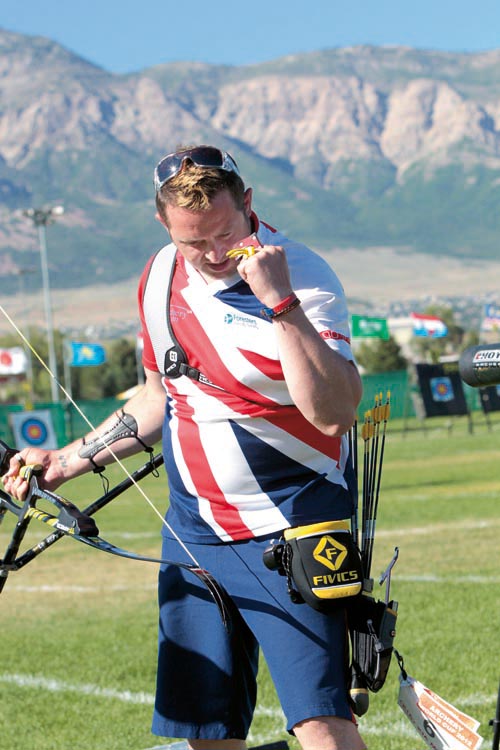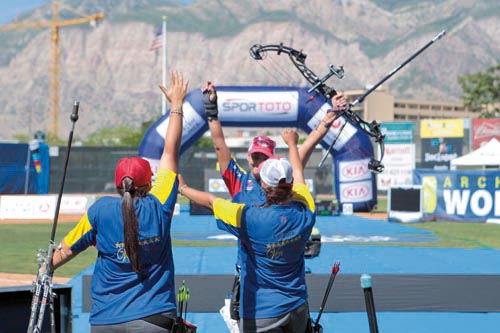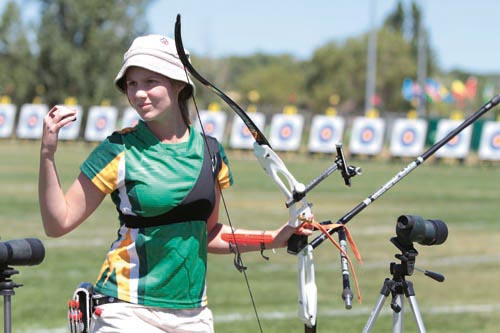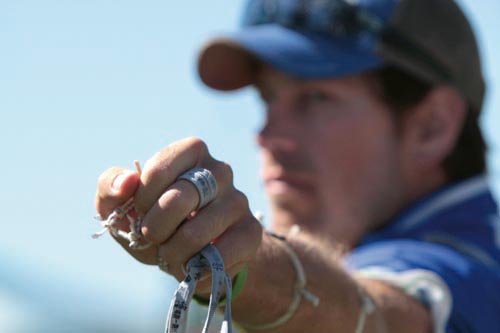The mental realm is lauded as the final frontier of high performance archery. A plethora of literature awaits should you find yourself seeking the secrets to this black art, penned by champions of unparalleled achievement. There are schools, programmes, bullet-lists, private tutoring sessions, weekend crash-courses, and audio tracks – there is truly no shortage of information, especially if you consider cross- disciplinary material.
Fundamentally, most of this material is wrong. A lot of it follows a similar style to self-help books and goes down the same route of trying to create successful habits and thinking patterns by means of rote memorisation, practice, and outright hypnotisation or mind- erasing. I don’t know about you, but I’ve never been able to fundamentally lie to myself about what I was capable of doing – to somehow, by way of reading post-it notes on my mirror every morning, truly believe I was a champion in ways I had not yet achieved. The problem here is a matter of the head versus the heart. When the battle of wills gets ferocious, who wins?
I don’t think this is purely semantics or subtle differences of definition. Rightly so, many books on the mental aspect of archery include wonderfully insightful bits and have helped create new champions for generations. But what is the subject matter of the insightful bits?
I can’t help but feel overwhelmed when I watch some incredible sporting feat, and I can take the Olympics as an example. In the middle of a crowded coffee shop, I can watch Haile Gebrselassie blitz around a track and feel a half ache, half psychosis supplanting myself in his quickly-moving shoes, feeling my lungs burn and the dread of moving ever further at so punishing a pace. You may cry out, “You are visualising. That is mental imagery.” and perhaps you are right, but you can be assured it is decidedly not cerebral.
 I just cannot believe that archery is a thinking man’s sport. By ultimately calling archery a mental sport, we are mixing our metaphors and leading would-be champions down a path of deception.
I just cannot believe that archery is a thinking man’s sport. By ultimately calling archery a mental sport, we are mixing our metaphors and leading would-be champions down a path of deception.
It seems obvious to me that it is not possible to control your thoughts by thinking more. Isn’t that practically true by recursive definition? If there is one thing we humans are good at, it is spiralling and fractious thought. So, once and for all, let’s separate our definitions and get to the meat of the matter. The head game of archery is the left-brain technique, planning, training schedules, trip organisation, equipment testing, data collection, and performance peaking. And yes, there is a whole dark art about this side of archery, full of creativity and adaptation and experimentation. And yes, you can become overwhelmed and emotional about
missing pieces of this puzzle should you not have them in your support crew nor possess a natural tendency for sifting through the information. It is also true that there is a lot of helpful literature, especially cross-disciplinary, that can teach archers a lot. Almost every archer I know is hugely under-informed about peak-optimised training habits and schedules gleaned or adapted from other sports with a more robust sports-science background. Even in the cases where individuals do know about these things, a lack of personal energy makes it impossible to assemble all the necessary parts, not to mention the continuing drive and determination to stick to rigorous schedules and commitments. I suppose a lack of money in the sport is the biggest reason for this, because the coaches that understand these things can make a lot more money teaching tennis, running, swimming or something equally commercialised.
What is left after all of this thinking and analysing is the heart – the champion’s spirit: a mix of honour, courage, fearlessness and straight-up insanity. And it is my desire to change the very words we use when describing this mystery-shrouded area of archery, so we may better explain ourselves and come to greater levels of understanding and mastery. Where all the magic of archery happens is at our core, a reverted default setting when our hopes and dreams are on the line, and the future is a diverted fork of uncomfortable possibilities. When we are young and still developing our personalities, we smash through barriers left and right and don’t have much awareness of our own limits and capabilities. Time and success are cages that creep into our lives and, atom by atom, trap our upward trajectory. Where we once wouldn’t have noticed the errant arrow, the notion of not losing now easily engulfs and obscures the old idea of winning.
Shooting well is not a matter of flexing our brains in the same way one might while doing integral calculus. A poet would not say he writes with his head as much as he would with his heart, and archers should follow suit.
When we get nervous, our brains are often most active – albeit importantly scattered. Such activity is likely the reason so many people want to call this area the mental side of archery, though their reasons for doing so are misguided. How many times have you heard your friends say some platitude about there always being more fish in the sea, but no amount of hearing it could stop the ache of your lost love one until your heart truly moved on? Our minds may know a great many things, but our bodies are not always equally apt listeners.
I believe that reinforcing imagery, practice, shot routines, and many other lauded bits are vitally important to world-class shooting; you truly have to cover your bases and paint a complete picture. But always remember there is some intricately human part of you that cannot, and will not, accept anything but the truth. That no amount of purported lying or deception will ever fool you, no matter how well-intentioned. Your practice routines and imagery training of shooting every arrow in the middle of the target somehow feel hollow and unsatisfying. I say embrace the madness, the imperfection, the uncomfortable, the unobtainable. And then, set your head aside, and shoot with your heart.
It is possible to train the heart, and many of us already do so. Have you ever heard someone say, “I need to work on my heart-game.” Tournament experience is an obvious one, but I think equal amounts can be learned go-kart racing with friends, braking late into the last corner for the win, or watching Haile Gebrselassi while emotionally running in his shoes. When it comes to matters of the heart, you just have to stretch yourself and eventually come out whole on the other side. It has to be real and true and genuine to you or else it will never mean anything. If your heart doesn’t actually care, you won’t learn anything. You probably already know all these things, and have been nodding while reading – good. The important thing to remember is, the next time your nerve fails you when it counts, don’t blame your head, and don’t go thinking that some revised shot preparation or imagery is going to unlock some secret key. Learn to fight your damnedest, and recognise that doing so takes the heart of a lion.





Inspiring 🙂